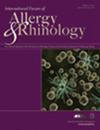Patient-reported disease control versus overall symptom severity as global metrics of chronic rhinosinusitis disease status
Abstract
Background
Overall symptom severity (OSS) and patient-reported chronic rhinosinusitis (CRS) control are global measures of CRS identified as consensus, essential criteria for CRS disease control assessment. We sought to determine the functional relationship between these two metrics.
Methods
Using an international multicenter mixed-methods design, 260 CRS patients were recruited. OSS score was measured using a visual analog scale. Patient-reported CRS control was measured as “controlled,” “partly controlled,” and “uncontrolled.” Twelve participants underwent semi-structured interviews to discuss OSS and patient-reported CRS control.
Results
The majority of interviewed participants felt OSS and patient-reported CRS control measured different constructs—while OSS only measured symptoms, patient-reported CRS control was more global, including not only symptom severity but also concepts such as medication usage, activity impairment, and exacerbations. Nevertheless, OSS score was strongly correlated with (ρ = 0.67, p < 0.001) and highly predictive of patient-reported CRS control. OSS score of >4 (95% confidence interval [CI]: 1.8–4.2) had 74.7% sensitivity and 93.2% specificity in identifying patients reporting their CRS as not controlled. OSS score of >6.6 (95% CI: 4.1–7.1) had 77.0% sensitivity and 75.9% specificity in identifying patients reporting their CRS as uncontrolled. The 22-item Sinonasal Outcome Test score was also predictive of patient-reported CRS disease control but OSS was significantly more predictive.
Conclusions
Patients conceptually view patient-reported CRS control as a more global measure that subsumes OSS. Quantitatively, however, OSS is highly correlated with patient-reported CRS control, possibly reflecting their redundancy. For ease of use, we recommend patient-reported CRS control be reflected by OSS <4 for controlled, 4 ≤ OSS < 7 for partly controlled, and OSS ≥7 for uncontrolled CRS.


 求助内容:
求助内容: 应助结果提醒方式:
应助结果提醒方式:


